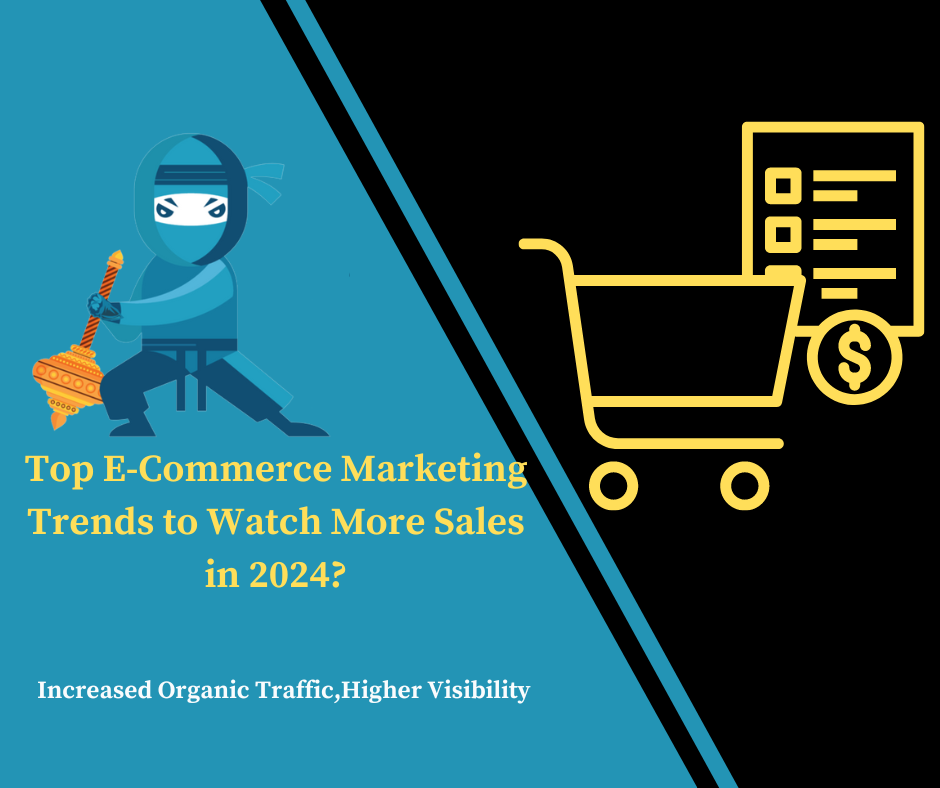Top E-Commerce Marketing Trends to Watch for More Sales in 2024
As the digital landscape continues to evolve, e-commerce businesses must stay ahead of the curve to maintain a competitive edge and drive sales. In 2024, e-commerce marketing will be shaped by several key trends that promise to transform how businesses engage with their customers. This article explores these trends, offering insights into how they can be leveraged to boost sales.
1. Artificial Intelligence (AI) and Machine Learning
AI and machine learning are revolutionizing e-commerce marketing by enabling more personalized and efficient customer interactions. These technologies can analyze vast amounts of data to predict consumer behavior, optimize marketing strategies, and enhance user experiences.
Key Applications:
Personalized Recommendations: AI algorithms analyze past purchase behavior and browsing history to suggest products tailored to individual preferences.
Chatbots and Virtual Assistants: These AI-driven tools provide real-time customer support, answer queries, and guide users through the purchasing process.
Dynamic Pricing: Machine learning models can adjust prices based on demand, competition, and other factors to maximize sales and profit.
Actionable Tip
Invest in AI-powered tools to enhance personalization and automate repetitive tasks, freeing up resources for strategic activities.
2. Voice Commerce
With the increasing use of voice-activated devices like Amazon Echo and Google Home, voice commerce is emerging as a significant trend. Consumers are using voice commands to search for products, make purchases, and get recommendations.
Key Considerations:
Voice Search Optimization: Ensure your product listings and content are optimized for voice search by focusing on natural language and conversational keywords.
Voice-Activated Shopping: Develop voice-activated shopping experiences and integrate with platforms like Amazon Alexa and Google Assistant.
Actionable Tip
Optimize your e-commerce site for voice search and consider developing a voice-activated app or integration to capture this growing market.
3. Augmented Reality (AR) and Virtual Reality (VR)
AR and VR technologies are transforming the online shopping experience by offering immersive and interactive ways for customers to explore products.
Key Applications:
Virtual Try-Ons: AR allows customers to try on clothing, accessories, or even makeup virtually, improving their confidence in purchase decisions.
Virtual Showrooms: VR can create immersive product experiences, enabling customers to explore and interact with products in a virtual environment.
Actionable Tip
Implement AR and VR solutions to enhance the online shopping experience, reduce return rates, and increase customer satisfaction.
4. Sustainability and Ethical Marketing
Consumers are becoming increasingly aware of environmental and ethical issues, influencing their purchasing decisions. E-commerce brands that demonstrate commitment to sustainability and ethical practices are likely to attract and retain customers.
Key Strategies
Transparent Practices: Communicate your sustainability efforts, such as eco-friendly packaging or ethical sourcing.
Green Certifications: Obtain certifications that verify your commitment to environmental and ethical standards.
Actionable Tip
Incorporate sustainability into your marketing strategy and highlight your ethical practices to resonate with conscious consumers.
5. Influencer Marketing Evolution
Influencer marketing continues to be a powerful tool for driving sales, but its approach is evolving. In 2024, micro-influencers and niche content creators are gaining prominence over mega-influencers.
Key Trends
Micro-Influencers: These influencers have smaller but highly engaged audiences, offering more authentic and targeted marketing opportunities.
Long-Term Partnerships: Building long-term relationships with influencers can lead to more genuine endorsements and sustained brand loyalty.
Actionable Tip
Collaborate with micro-influencers and focus on building long-term partnerships to enhance authenticity and reach.
Also read: Ultimate Guide: Boost Website Speed for Higher Conversions
6. Social Commerce
Social media platforms are increasingly integrating e-commerce features, allowing users to shop directly from social media posts and ads.
Key Features
Shoppable Posts: Platforms like Instagram and Facebook enable users to purchase products directly from posts and stories.
Live Shopping: Live streaming events where products are showcased and sold in real-time are becoming popular.
Actionable Tip
Utilize social commerce features to drive sales directly from social media channels and engage with your audience through live shopping events.
7. Enhanced Data Privacy and Security
As data privacy concerns grow, e-commerce businesses must prioritize data security and compliance with regulations such as GDPR and CCPA.
Key Measures
Secure Payment Systems: Implement robust payment security measures to protect customer information.
Transparent Data Practices: Communicate how customer data is collected, used, and protected.
Actionable Tip
Ensure your e-commerce platform adheres to data privacy regulations and invest in secure payment technologies to build trust with customers.
FAQ
What is e-commerce marketing?
E-commerce marketing refers to the strategies and techniques used to promote and sell products or services online. It encompasses various digital marketing tactics, including SEO, social media marketing, email marketing, and more.
How can AI improve e-commerce marketing?
AI can enhance e-commerce marketing by providing personalized recommendations, automating customer support with chatbots, optimizing pricing strategies, and analyzing customer data for better decision-making.
What is voice commerce and why is it important?
Voice commerce involves using voice-activated devices to search for products, make purchases, and receive recommendations. It’s important because it represents a growing trend in how consumers interact with technology and make buying decisions.
How can AR and VR benefit my e-commerce business?
AR and VR can improve the online shopping experience by offering virtual try-ons and immersive product interactions, which can increase customer satisfaction, reduce returns, and drive sales.
Why is sustainability important in e-commerce marketing?
Sustainability is important because consumers are increasingly concerned about environmental and ethical issues. Demonstrating a commitment to sustainable practices can attract and retain customers who prioritize these values.
What role do micro-influencers play in e-commerce marketing?
Micro-influencers have smaller but highly engaged audiences, making their endorsements more authentic and targeted. They offer cost-effective marketing opportunities and can help build genuine brand loyalty.
What is social commerce and how can it boost sales?
Social commerce involves selling products directly through social media platforms. It can boost sales by enabling users to shop seamlessly from social media posts and ads and by leveraging live shopping events to engage customers in real time.
How can I ensure my e-commerce site is secure?
To ensure security, implement secure payment systems, use encryption technologies, and comply with data privacy regulations. Regularly update your security protocols and communicate your data protection practices to build customer trust.
Conclusion
In this article, we’ve explored the top e-commerce marketing trends that are set to make a significant impact in 2024. From leveraging AI and machine learning to embracing voice commerce and augmented reality, these trends offer innovative ways to enhance customer engagement and drive more sales. Staying ahead of these e-commerce marketing strategies will position your business for success in the competitive online marketplace.








